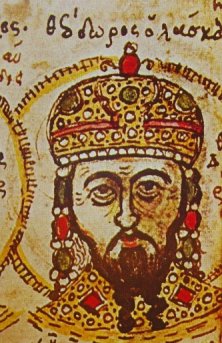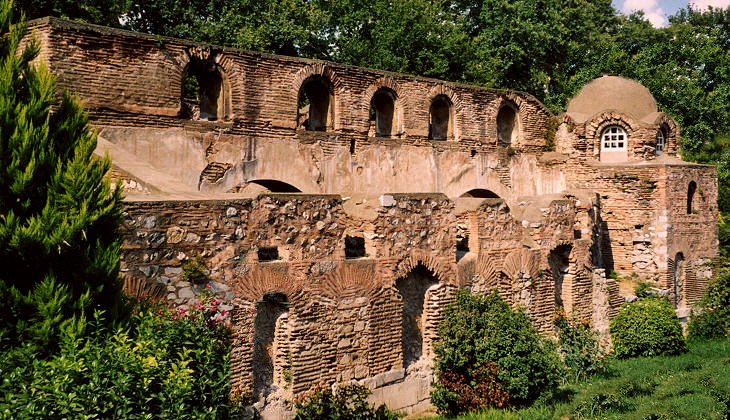|
|
|
Theodore Lascaris was a noble prince of the Greek Empire. He was born in 1175 and fought bravely
during the siege of Constantinople by the Latins in 1204. As son-in-law of the Byzantine emperor Alexius III Angelus
he was in command of a large military corps, but failed to defeat the European
invaders. After the fall of Constantinople, he found refuge in
Nicaea of Bithynia. In the city which hosted the First Ecumenical Council (325),
Lascaris founded a new Greek state. The same time two other Greek states
were founded: the Despotat of Principality of Epirus and the Empire of Trebizond.
The situation of the Empire of Nicaea was very dangerous: from the east it was threatened by the Turks, from the west by the
Latin Emperor of Constantinople and from the north by the Bulgars. But the conflich between Franks and Bulgars, helped
the Empire of Nicaea to survive from its superior enemies. In the battle of Adrianople, (1205) Tsar Kaloyan
defeated the crusaders and killed the Latin Emperor of Constantinople Baldwin. Kalojan ("Kalos Ioannes" means "Good John"
in greek) proudly presented himself as the "slayer of Rums (Greeks)" (Romaioctonus). The Latins
called him a "great destroyer of Greece" (magnus populator Graeciae).
The Bulgar Tsar managed to conquer Macedonia but his campaign ended fatally for him.
In 1207 he besieged Thessaloniki but suddenly died. The siege of the city was lifted.
Tsar Kaloyan's death arose many rumors, one of which alleging that Saint
Demetrius pierced him with his lance.
After the death of his two enemies Lascaris was free to organize his state. The Greeks saw in his sovereign
a possible liberator from the Latin conquerors and a spokesman for their national expectations and hopes.
Nicaea had a significant economic growth, and a cultural revival. Lascaris improved agriculture and stockbreeding,
built schools, hospitals and poorhouses. Magnificent palaces and numerous
churches and monasteries adorned the Greek capital.
In the meantime Theodore Lascaris' father-in-law, Alexius III Angelus, fled to the sultan of Iconion
and asked for help to gain the throne of Nicaea. The sultan threatened Theodore
to deliver the throne to Alexius, otherwise he had to face his army.
Hostilities began between Greeks and Turks at Antioch of Pisidia by the Meandros river.
The soldiers of Theodore displayed great heroism and inflicted enormous losses on the superior enemy.
The sultan was slain by Theodore himself after a duel on horseback and the former
emperor, Alexius III, who had taken refuge with the Turks, was captured.
The moral significance of the victory of the Greek Emperor of Nicaea over the Muslims was very great:
it confirmed the new state revived the former Byzantine traditions of the struggle against Islam,
and filled with joy and vigor the hearts of the Greeks, who, for the first time, saw in Nicaea a possible
center of their future Empire.
After a period of warfare with Henry of Flanders, emperor of Constantinople, Theodore signed a treaty (1214)
defining the frontiers between the Greek empire of Nicaea and the Latin
empire of Constantinople. After Henry's death (1216), Theodore strengthened his ties to the
Latin empire by taking as his third wife Marie de Courtenay, daughter of the empress Yolanda of Flanders.
In 1222, shortly before his death, he negotiated a
settlement with Yolande's son and successor as Latin emperor, Robert of
Courtenay, who was married with his daughter Eudocia. On his death Theodore was
succeeded as emperor of Nicaea by his son-in-law John III Doukas Vatatzes.



